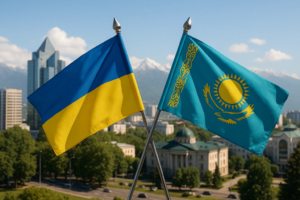
Почти половина украинцев выражает положительное отношение к Казахстану, тогда как отрицательные оценки остаются относительно немногочисленными. Об этом свидетельствуют результаты опроса, проведенного компанией Active Group совместно с аналитическим центром Experts Club.
Согласно исследованию, 42,7% респондентов имеют положительное отношение к Казахстану (8,7% — полностью положительное, 34,0% — в основном положительное). При этом 48,7% заняли нейтральную позицию. Негативно высказались только 8,0% опрошенных (1,7% — полностью негативно, 6,3% — в основном негативно). Только 0,7% отметили, что не знакомы с этой страной.

«Казахстан для украинцев является партнером в постсоветском пространстве, который воспринимается скорее нейтрально или умеренно положительно. Существенного негатива в отношении населения нет», — прокомментировал результаты исследования руководитель компании Active Group Александр Позний.
Экономические показатели подтверждают взаимовыгодность сотрудничества. Как подчеркнул соучредитель Experts Club Максим Уракин, в январе-августе 2025 года товарооборот между Украиной и Казахстаном составил 202,0 млн долларов США.
«Украинский экспорт в Казахстан достиг 157,8 млн долларов, тогда как импорт — 44,2 млн долларов. Положительное сальдо для Украины составляет более 113,5 млн долларов, что свидетельствует о чрезвычайно выгодном балансе в двусторонней торговле», — подчеркнул эксперт.
Таким образом, Казахстан воспринимается украинцами как страна с относительно положительным имиджем и важным торговым партнером Украины.
Полное видео можно посмотреть по ссылке:
Подписаться на YouTube-канал Experts Club можно здесь:
ACTIVE GROUP, EXPERTS CLUB, КАЗАХСТАН, Позний, СОЦИОЛОГИЯ, ТОРГОВЛЯ, УКРАИНА

Almost half of Ukrainians express a positive attitude toward Kazakhstan, while negative assessments remain relatively few. This is evidenced by the results of a survey conducted by Active Group in collaboration with the Experts Club analytical center.
According to the study, 42.7% of respondents have a positive attitude towards Kazakhstan (8.7% — completely positive, 34.0% — mostly positive). At the same time, 48.7% took a neutral position. Only 8.0% of respondents expressed a negative opinion (1.7% — completely negative, 6.3% — mostly negative). Only 0.7% said they were not familiar with the country.

“For Ukrainians, Kazakhstan is a partner in the post-Soviet space that is perceived as neutral or moderately positive. There is no significant negativity in the attitude of the population,” commented Alexander Pozniy, head of Active Group, on the results of the study.
Economic indicators confirm the mutual benefits of cooperation. As Maxim Urakin, co-founder of Experts Club, pointed out, in January–August 2025, trade turnover between Ukraine and Kazakhstan amounted to $202.0 million.
“Ukrainian exports to Kazakhstan reached $157.8 million, while imports amounted to $44.2 million. The positive balance for Ukraine is over $113.5 million, which indicates an extremely favorable balance in bilateral trade,” the expert emphasized.
Thus, Kazakhstan is perceived by Ukrainians as a country with a relatively positive image and an important trading partner of Ukraine.
The full video can be viewed at:
You can subscribe to the Experts Club YouTube channel here:
ACTIVE GROUP, EXPERTS CLUB, KAZAKHSTAN, Pozniy, SOCIOLOGY, TRADE, UKRAINE, URIKIN
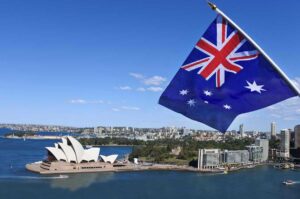
According to the results of a study conducted by Active Group in collaboration with Experts Club in August 2025, Ukrainians’ attitude towards Australia is predominantly positive. 63.0% of respondents expressed a positive attitude towards this country, while only 2.2% of respondents had a negative attitude. At the same time, 32.3% took a neutral position, and 2.4% admitted that they found it difficult to answer this question.
The largest share of positive responses fell into the “mostly positive” category – 40.0%, while 23.0% of respondents expressed a “completely positive” attitude. On the other hand, 1.9% of respondents had a “mostly negative” attitude, and only 0.4% had a “completely negative” attitude.
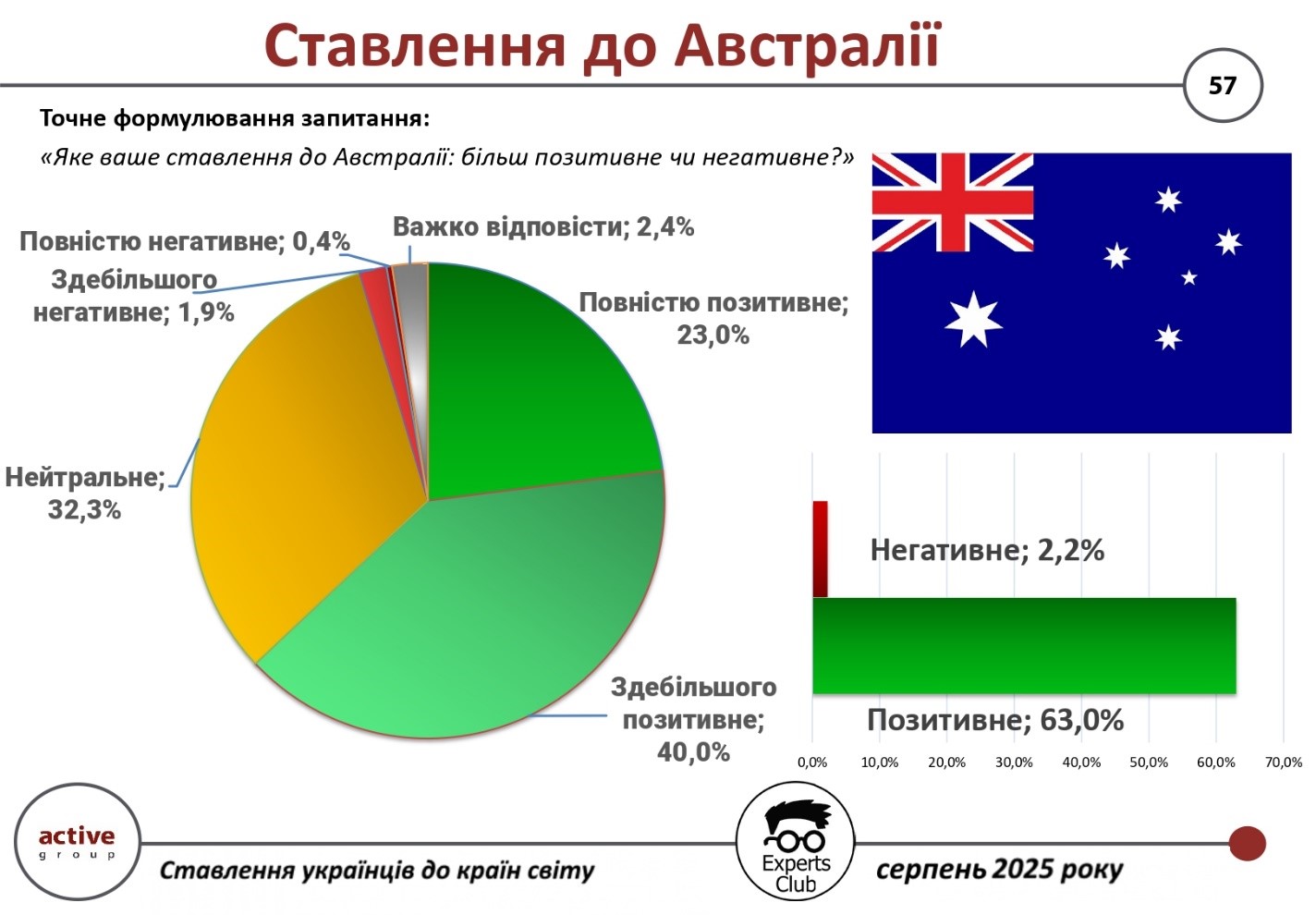
In 2024, trade turnover between Ukraine and Australia amounted to US$157.4 million. At the same time, exports of Ukrainian goods to Australia amounted to only US$6.4 million, while imports of Australian products amounted to US$151.0 million. The negative balance for Ukraine was recorded at US$144.6 million.
“The main areas of Australian exports to Ukraine traditionally include mineral raw materials, industrial goods, and agricultural products. In contrast, Ukrainian exports to Australia have a limited range and are mainly concentrated in the agricultural and metallurgical sectors,” notes economist and founder of Experts Club Maksim Urakin.
The full video can be viewed at: https://www.youtube.com/watch?v=YgC9TPnMoMI&t
You can subscribe to the Experts Club YouTube channel here: https://www.youtube.com/@ExpertsClub
ACTIVE GROUP, AUSTRALIA, EXPERTS CLUB, Pozniy, SOCIOLOGY, TRADE, UKRAINE, URAKIN
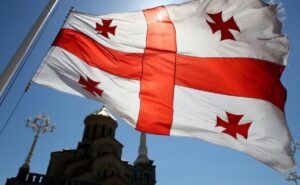
Most Ukrainians have a positive opinion of Georgia, according to the results of a survey conducted by Active Group in collaboration with the analytical center Experts Club.
According to the study, 56.3% of Ukrainians expressed a positive attitude towards Georgia: among them, 14.3% are completely positive, and 42.0% are mostly positive.
At the same time, 10.7% of respondents have a negative attitude (1.7% completely negative and 9.0% mostly negative). A third of respondents (32.3%) remain neutral, while another 0.7% admitted that they are not sufficiently knowledgeable about the country.
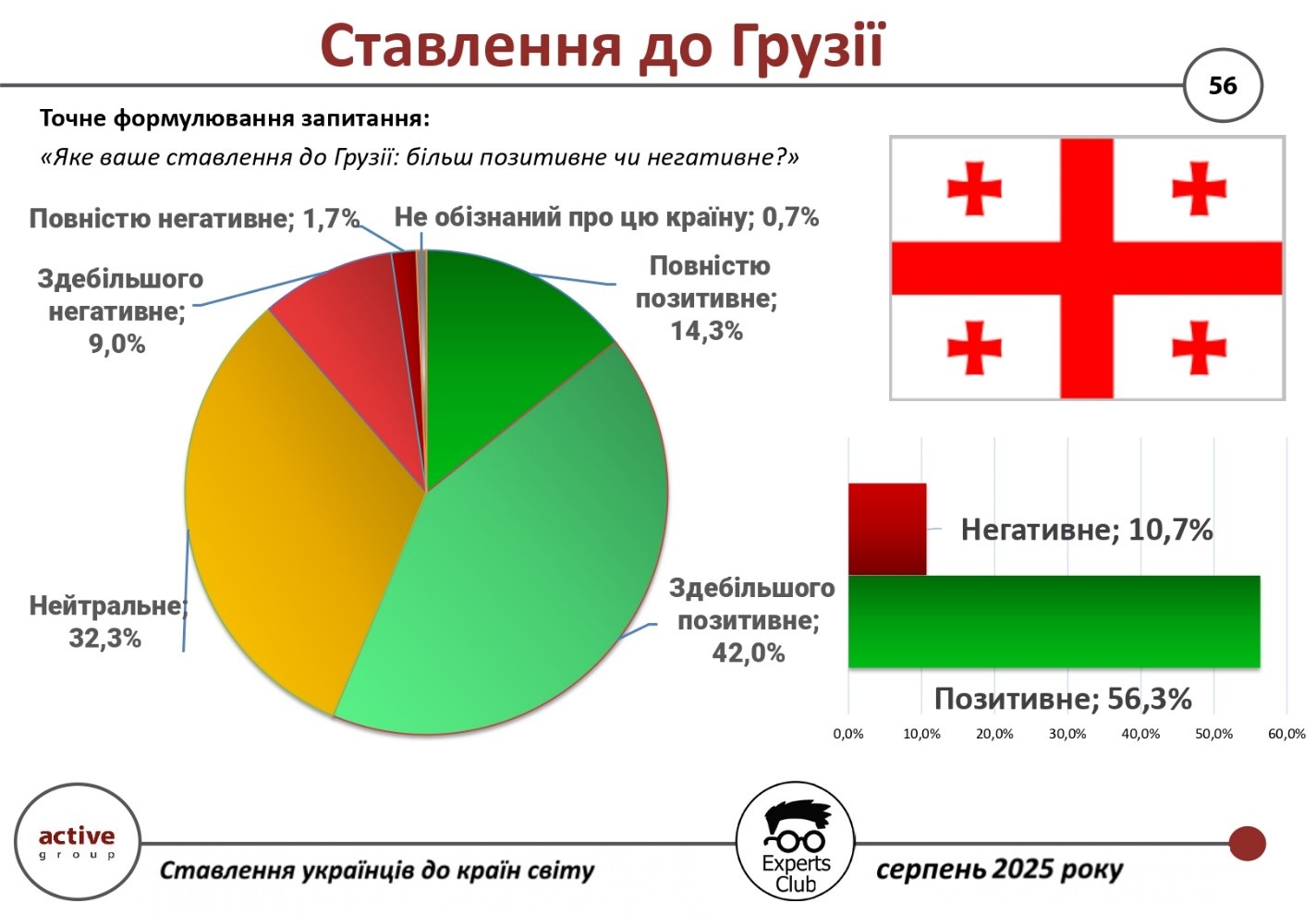
At the end of 2024, Ukraine’s trade turnover with Georgia amounted to $1,828.2 million. Exports of Ukrainian goods to Georgia reached $1,360.8 million, while imports amounted to $467.4 million. Thus, Ukraine had a positive bilateral trade balance of $893.4 million.
According to economist and founder of Experts Club Maksim Urakin, the positive balance with Georgia reflects a sustained interest in mutual cooperation:
“Georgia traditionally remains an important trading partner for Ukraine in the Caucasus. The high level of positive attitudes among Ukrainians toward this country is a favorable foundation for the further development of economic and cultural relations,” the expert emphasized.
Thus, Georgia is among the group of countries that Ukrainians view mostly positively, and strong economic ties and shared historical proximity create the basis for further deepening the partnership.
The full video can be viewed at: https://www.youtube.com/watch?v=YgC9TPnMoMI&t
You can subscribe to the Experts Club YouTube channel here: https://www.youtube.com/@ExpertsClub
ACTIVE GROUP, EXPERTS CLUB, GEORGIA, Pozniy, SOCIOLOGY, TRADE, UKRAINE, URAKIN

A survey conducted by Active Group in collaboration with Experts Club showed that most Ukrainians refrain from giving clear assessments of Malaysia: 68.3% of respondents said they had a neutral attitude toward this country.
At the same time, 18.7% of Ukrainians expressed a positive attitude (in particular, 2.3% said they were “completely positive” and 16.3% said they were “mostly positive”), while 4.7% expressed a negative attitude. Another 8.3% of respondents admitted that they did not have enough information about Malaysia to form an opinion.
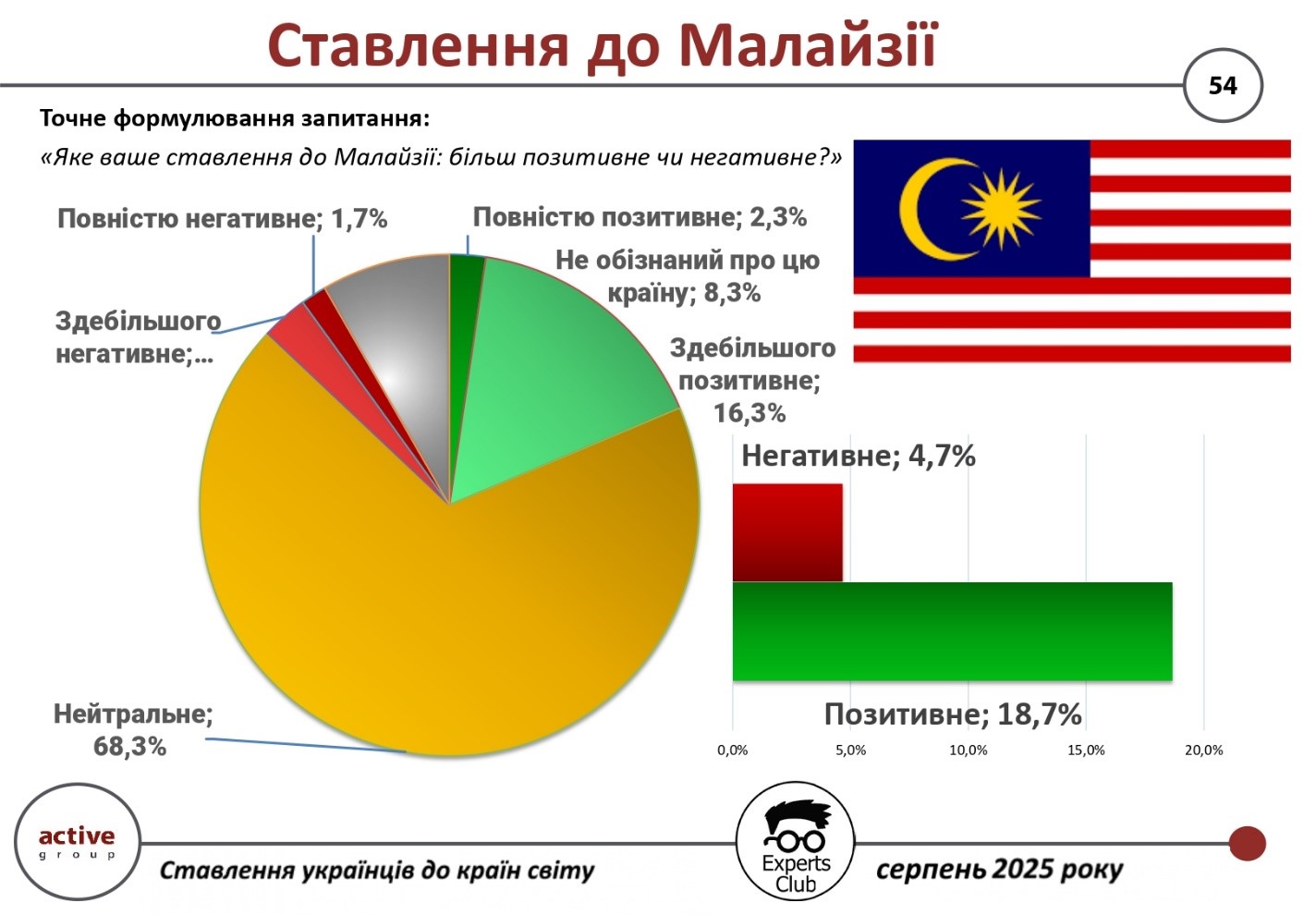
According to the results of Ukraine’s foreign trade with Malaysia in the first half of 2025, the trade turnover amounted to $193.8 million. At the same time, Ukrainian exports amounted to only $41.2 million, while imports from Malaysia reached $152.6 million.
Thus, the negative balance for Ukraine amounted to $111.4 million, which indicates a significant dependence on Malaysian imports.
The founder of Experts Club, economist Maksim Urakin, emphasized that in relations with Malaysia, it is worth focusing on expanding Ukraine’s export opportunities.
“Today, we see a significant imbalance in trade with Malaysia, which reduces the economic effect of cooperation for Ukraine. A promising direction could be agro-industrial exports, in particular products from the food and processing industries. At the same time, the neutral attitude of most Ukrainians opens up space for the development of cultural and information diplomacy,” the expert stressed.
The full video can be viewed at: https://www.youtube.com/watch?v=YgC9TPnMoMI&t
You can subscribe to the Experts Club YouTube channel here: https://www.youtube.com/@ExpertsClub
ACTIVE GROUP, EXPERTS CLUB, MALAYSIA, Pozniy, SOCIOLOGY, TRADE, UKRAINE, URAKIN
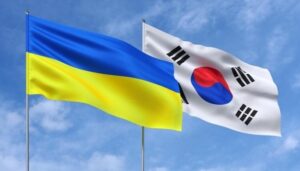
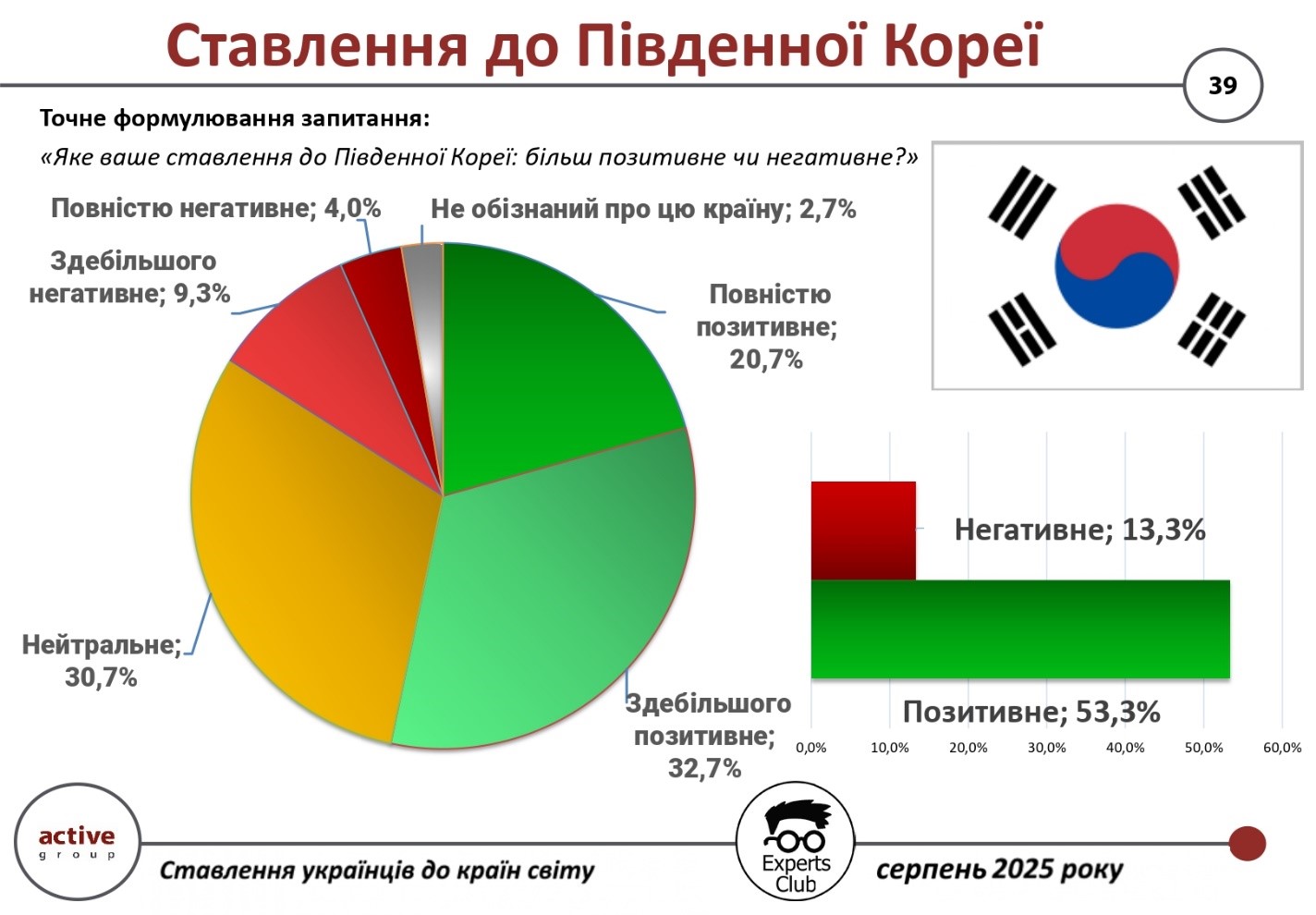
According to a survey conducted by Active Group in cooperation with Experts Club in August 2025, more than half of Ukrainians have a positive opinion of South Korea.
In total , 53.3% of respondents expressed favorable attitudes toward this country (32.7% – mostly positive, 20.7% – completely positive). A neutral attitude was recorded in 30.7% of respondents, and negative assessments amounted to 13.3%. Another 2.7% said they did not know enough about the country.
“South Korea is perceived by Ukrainians as a modern high-tech country that is developing dynamically and at the same time preserving its cultural identity. Ukrainians see it as a potential partner, especially in the field of technology, education, and innovation,” said Oleksandr Poznyi, CEO of Active Group.
At the same time, Maksym Urakin, co-founder of Experts Club, emphasized the economic dimension of bilateral relations:
“In the first half of 2025, the total trade turnover between Ukraine and the Republic of Korea amounted to more than $518 million. Exports of Ukrainian goods amounted to only $96.9 million, while imports amounted to more than $421 million. This resulted in a negative trade balance of $324 million. The situation demonstrates the need for more active promotion of Ukrainian goods to the Korean market, particularly in the agricultural and food sectors,” he emphasized.
The research is part of the systematic monitoring of Ukraine’s international relations and public opinion about its partners in the world.
The full video can be viewed here:
https://www.youtube.com/watch?v=YgC9TPnMoMI&t
You can subscribe to the Experts Club YouTube channel here:
https://www.youtube.com/@ExpertsClub
ACTIVE GROUP, EXPERTS CLUB, Poznyi, SOCIOLOGY, SOUTH KOREA, TRADE, UKRAINE, URAKIN